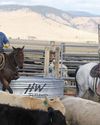Work your horse at liberty to build his trust, enhance his responsiveness under saddle, and boost your confidence. Top trainer/ clinician Julie Goodnight shows you how.

Working your horse at liberty gives you a superior level of connection with him. At liberty simply means that he has no restraint — no lead line or tether.
Building a trusting relationship with your horse will teach him to respond to your clear, consistent cues and will enhance your bond with him. It’ll also boost your confidence.
When your horse will respond willingly to your leadership and direction without a means of reinforcement, he’s tuned in to your gestures, postures, and movements, willing to follow any direction you give.
In the herd, horses follow the cues of their herd mates to know when to turn, stop, and move. In this way, your horse is programmed to tune in to your cues and work well at liberty. We’re the ones who need to learn the skills, become aware of our own body language, and be consistent with our cues.
When your horse learns that your body-language cues — your gestures and position — have meaning, he’ll love responding to them, because that’s his language. Give him clear cues, then reinforce those cues with a lead line or flag.
If you’re consistent over time, you’ll no longer need to use reinforcement, and you’ll be able to work without the tether. Your horse will learn to trust you to provide consistent cues, and you’ll show him that you trust him.
Your horse would much rather get a cue from your body language instead of first feeling a pull on the lead. He’ll learn that you’ll provide a body signal and a gesture before adding reinforcement.
And when your horse learns to trust you to ask before forcing him, he’ll respond to that same improved relationship in the saddle, tuning in and responding to your cues.
This story is from the JanuaryFebruary 2017 edition of The Trail Rider.
Start your 7-day Magzter GOLD free trial to access thousands of curated premium stories, and 9,000+ magazines and newspapers.
Already a subscriber ? Sign In
This story is from the JanuaryFebruary 2017 edition of The Trail Rider.
Start your 7-day Magzter GOLD free trial to access thousands of curated premium stories, and 9,000+ magazines and newspapers.
Already a subscriber? Sign In

Become a CHA-Certified Instructor
From passion to professionalism: Grow your dream of becoming an equine-industry professional.

Spirit Of The Black Hills
The 11,000-acre Black Hills Wild Horse Sanctuary, near Rapid City, South Dakota, is home to small herds of rare Spanish Mustangs. We take you on an inside tour of this windswept sanctuary.

12 Trailering Myths: Busted!
Learn the truth behind 12 common trailering myths to help keep your horse safe on the road.

Working Vacation
For your next getaway, don your gloves, coil your rope, and become a vital part of a working cattle ranch. Here’s a roundup of nine authentic working ranches to get you started.

Your Horse's Coggins Test
A negative Coggins test for equine infectious anemia is important — and sometimes required. Here’s what you need to know.

Ride For A Cause
Discover how planning a charity/benefit trail ride can be good for the soul.

The Charms Of Chama
Ride and camp yearround among majestic elk herds in New Mexico’s Edward Sargent Wildlife Management Area near the historic village of Chama.

Which Saddle Is For You?
Find the right saddle for your riding needs with our expert trail-saddle shopping guide.

Hoof-Chip Prevention Tips
Learn how to prevent chipped, brittle hooves in your horse with these expert guidelines.

Ground Work At Liberty
Work your horse at liberty to build his trust, enhance his responsiveness under saddle, and boost your confidence. Top trainer/ clinician Julie Goodnight shows you how.